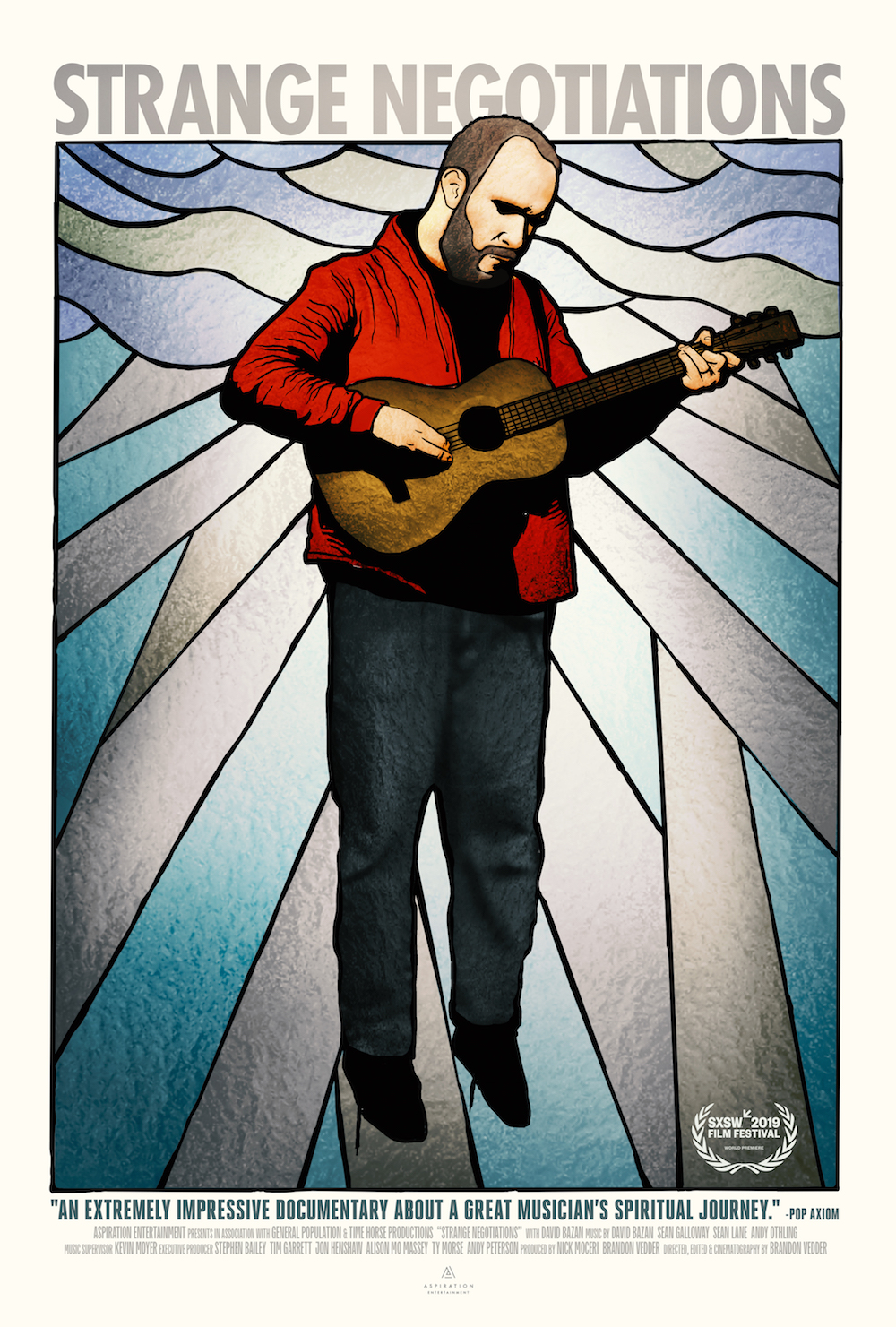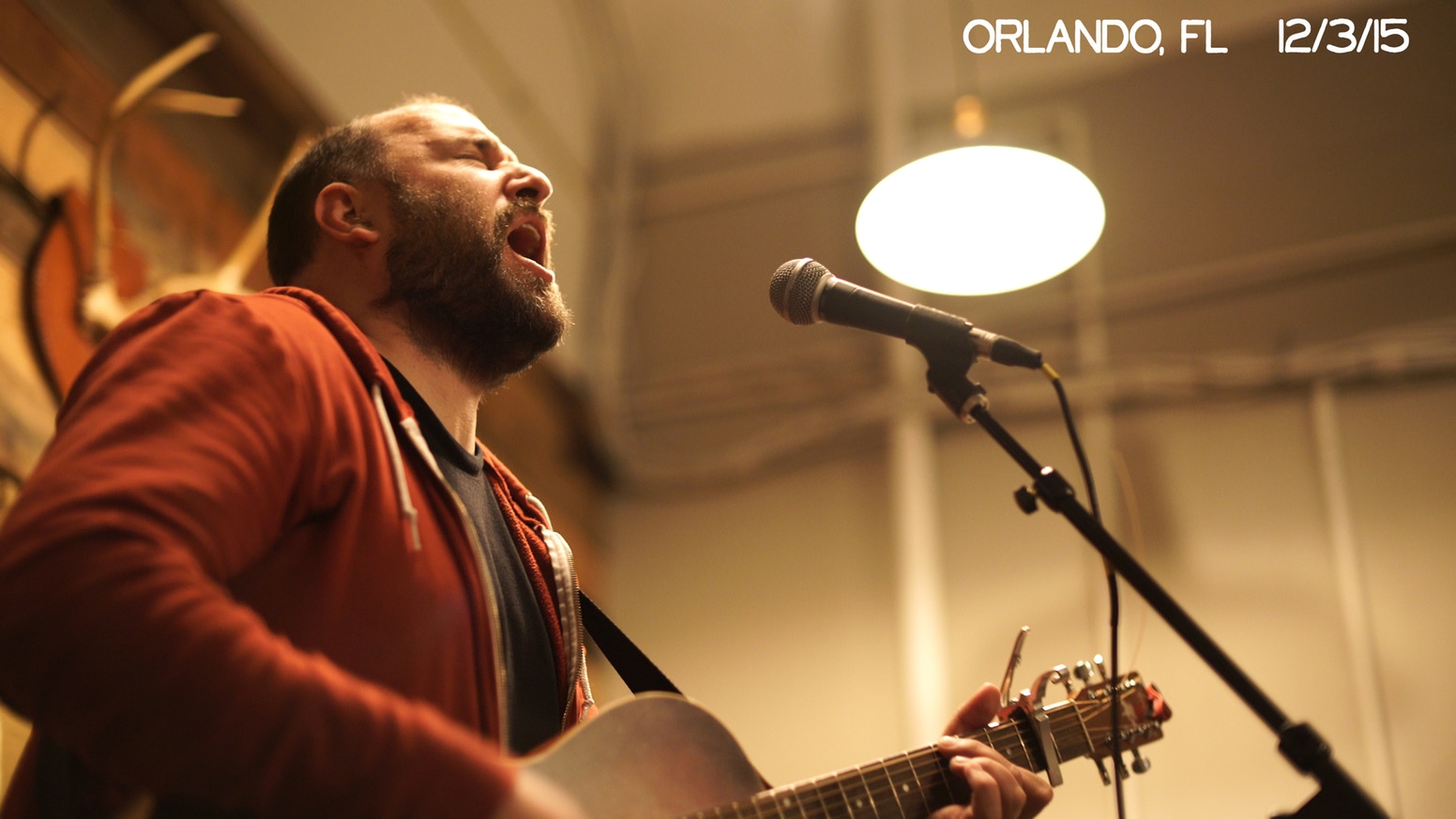 About halfway through Brandon Vedder’s upcoming documentary Strange Negotiations, David Bazan voices a simple statement that is equal parts confession, critique, and lament: “I am a son of evangelical Christianity and I will never not be that.”
About halfway through Brandon Vedder’s upcoming documentary Strange Negotiations, David Bazan voices a simple statement that is equal parts confession, critique, and lament: “I am a son of evangelical Christianity and I will never not be that.”
Bazan and his recently regrouped band Pedro the Lion are household names for many evangelicals of the ’90s. But for those who may be unfamiliar with his music or his story, the opening frames of the film tell us everything we need to know:
After walking away from his lifelong faith and beloved band Pedro The Lion, David withdrew into a solitary life on the road, touring the country as a solo act, performing primarily in fans’ living rooms. Ten years and five solo records later, touring remains his only reliable source of income, separating him from his wife and two kids for most of each year. This is his 137th day on the road…
From this sobering starting point, Strange Negotiations follows Bazan on one of his recent house show tours. At each location, he invites questions from the audience as part of his set list, which often leads to a discussion about his transition away from evangelical Christianity.
Strikingly, as he performs for fans all around the country, it becomes clear that many of them are on a similar kind of existential journey. Some remain devout believers in orthodox Christianity. Others are far less certain. Still others have decided that religious faith is no longer an option for them. Regardless, these intimate musical performances—and the conversations they prompt—become a generative, life-giving experience for those in attendance, and Bazan curates each of these encounters with the same kind of grace, transparency, and humility that has long endeared him to his fan base.
In this way, the film manages to stay focused on the particularities of Bazan’s story, but it does so by setting this one man’s personal journey against the backdrop of a series of broader shifts that are radically transforming the religious landscape of 21st Century American society—trends like the mass exodus of younger Americans away from their religion of origin, the growing depth and sophistication of atheists’ and agnostics’ religious knowledge in comparison to their Christian counterparts, and the increasingly partisan nature of all public discourse, religious and otherwise.
Bazan isn’t the only prominent musician in recent memory to move away from Christianity in full view of a predominantly evangelical following. Whether it’s George Perdikis (Newsboys), Derek Webb (Caedmon’s Call), or more recently Marty Sampson (Hillsong), the stories of deconversion among musicians who at some point identified as Christian artists seem to be growing with each passing day. And right alongside them are countless other sons and daughters of evangelical Christianity who hear in their music a familiar spiritual angst and turmoil.
Bazan’s story, an increasingly common one, raises an important question: How might the community of faith understand, care for, and learn from this group of musicians who have discernibly shaped the theological imagination of the evangelical community, but who have now moved beyond Christian orthodoxy?

Boundary Crossers
Speaking as a musician myself, a helpful starting point might be to acknowledge that, at their core, music and music-making involve crossing boundaries. It simply comes with the territory.
But this isn’t to say anything new. Augustine said as much in his Confessions. On the one hand, he pointed to his experience of music as one of the key reasons he felt compelled to convert to Christianity. Guided by the awe-inspiring power of music, Augustine transitioned from a position of unbelief to belief. By doing so, he affirmed the psalmist’s call to “sing to the Lord a new song” (Psalm 96:1) and the Apostle’s commendation to the church at Colossae to “teach and admonish one another with all wisdom through psalms, hymns, and songs from the Spirit, singing to God with gratitude in your hearts” (Colossians 3:16).
On the other hand, Augustine remained forever suspicious of music’s ability to direct his energies not only toward, but also away from God. In Augustine’s words, a melody sung by a sweet and well-trained voice, “to which the soul must not be delivered so as to be weakened, often leads me astray, when sense does not accompany reason in such a way as to follow patiently after it…. Thus in such things I unconsciously sin, but later I am conscious of it” (Confessions 10.33.49).
I don’t think we need to be as skeptical of music as Augustine was, especially in light of the consistency with which it connects us to God. But we do need to acknowledge along with Augustine that it is in the very nature of music to cross boundaries, and sometimes this movement does in fact lead musicians and listeners in directions that are not oriented toward God.
Interestingly enough, the idea that music has the power to carry listeners across certain thresholds that they may not be willing to cross predates even Augustine. In fact, some of the oldest stories in human history are about music’s mysterious, boundary-crossing power.
Greek legend, for example, claims that the greatest musician ever known to humanity was Orpheus. Because he was taught to play the lyre by the god Apollo, his music was not only capable of bringing the gods to tears and drowning out the voices of the deadly Sirens, but it even had the power to soften the heart of Hades himself. Indeed, when Orpheus descended into the underworld to retrieve his wife Eurydice, it was only after Orpheus played his lyre that Hades allowed Eurydice to return to the land of the living. Alas, because Orpheus could not heed Hades’ one and only condition (don’t look back!), Eurydice never emerged from the underworld, and Orpheus forever disdained the worship of the gods.
It’s just a story, of course, which I expand on in my book The Aesthetics of Atheism, but it taps into something fundamental about our experience of the world—music crosses boundaries.
Among all the arts, music has a unique capacity to pass through the borders that seem to so clearly separate life from death, darkness from light, and ecstasy from despair. At the same time, it guides listeners as they traverse these divisions, even (and perhaps especially) those separating the human from the divine. Musicians, therefore, will always be inclined to transgress in large part because their medium, by its very nature, refuses to stay within any prescribed limits.
And if this is true, then it shouldn’t be incredibly surprising that, among those raised in evangelical Christianity, musicians in particular so often cross the boundaries established by their religious tradition. After all, they are routinely asked by their local faith communities to navigate through the thin and permeable veil separating humanity from the divine. On any given Sunday in evangelical churches across the country, countless musicians are tasked with helping mediate between their local congregation and the God they have gathered to worship.
But when operating as a musician in the subculture of evangelicalism, these same expectations are in play whether the context is a church, a concert hall, a digital download, or a coffee shop. In other words, whether they like it or not, the music created and performed by “Christian” artists is assumed to exist as a means to guide the people of God into the presence of God. This is both the gift and the calling of the Christian musician.
It is also their burden, and a heavy one at that. Indeed, it’s not easy being a boundary-crosser in a context defined by a very specific set of limits. It’s even more difficult to inhabit this kind of space when it isn’t always clear which lines are ok to cross and which aren’t, when every potential transgression might have eternal consequences.
By following Bazan as he travels endlessly between venues, hotel rooms and highways, Strange Negotiations excellently depicts the physical, psychological, and spiritual toll that such a fraught existence can take on an artist.

Patience as the Pursuit of Harmony
But not all musicians are on the verge of de-converting, or pose some kind of imminent threat to others who are on a similar trajectory. Everyone is on a different journey. But what exactly does it look like to love and care for musicians and others who may doubt? In a word, it looks a lot like patience.
It is not incidental that Paul’s effusive exploration of love in 1 Corinthians 13:4-8 begins with patience, almost as if this particular virtue were the necessary precursor for all the others that follow. Patience for Paul serves as a kind of gateway, not only to each of the virtues he names, but ultimately to the very love that serves as both their origin and goal. In the absence of patience, it becomes difficult to imagine what kindness or trust or humility or hope would even mean.
But the goal of this kind of loving patience cannot be to move others from a position of non-belief to belief, especially when it comes to boundary crossing musicians. The goal should rather be to embrace them wherever it is they currently reside, even if indefinitely. To be sure, some may find it wholly unsatisfying or possibly even an abdication of Christian responsibility to suggest that we simply wait patiently, in large part because it sounds like such a passive approach.
And while I realize that it might seem rather meager at first blush, the truth of the matter is that patience is actually incredibly difficult. Neither passive nor inactive, patience is an active and engaged from of love, one that refuses to be bound by something so mundane as time.
In other words, demonstrating patience toward the doubters in our midst is first and foremost about us. It’s about being and becoming a people whose love is marked by patience—painstaking, longsuffering, life-giving patience.
It might be helpful to point out that the most current research on young and emerging adults would support an approach of this kind. The Fuller Youth Institute, for example, has found that it is not doubt that is toxic to faith. It’s silence. The church’s hesitance to talk about the uncertainties, questions, and differing views that so many Christians have (both young and old) has caused many people of faith to seek out other communities where their doubts can be acknowledged, engaged, and otherwise integrated into their lives.
A longing for this kind of community haunts Strange Negotiations. At each and every turn, Bazan struggles mightily with being away from his wife and children for such long stretches of time, but he does so because it is the only means by which he can provide for them financially.
His one saving grace is that, along the way, he becomes a pied piper for the other orphaned children of evangelicalism who show up to his living room concerts. They too yearn for the longsuffering community of faith they once knew but no longer recognize. And in some small but significant measure, they find it in Bazan’s house shows. There, in intimate groups of fellow music lovers, they hear from a man whose existential questions and music reflect their own misgivings. It hardly matters whether they identify as orthodox Christians, agnostics, atheists, or somewhere else on the spectrum of belief. What matters is that they have finally found resonance—a sacred space where “deep calls to deep” (Psalm 42:7).
Truth be told, it’s a picture of what the church was meant to be. At least in my estimation, church was never meant to be a place where we try to convince—or coerce—people to stay within some clearly demarcated set of boundaries, nor was it ever meant to be about guarding those boundaries to ensure that everyone who’s on the inside always stays inside and everyone on the outside stays there too.
Rather, the church was meant to be a community committed to loving each other unconditionally over the long haul—not in spite of our differences, dysfunctions, and flaws—but in and through the whole beautiful mess.
To put it in musical terms, loving boundary crossing musicians as a faith community is about the pursuit of harmony—a deeper, almost hidden, form of resonance. Harmonies emerge only when wholly distinct, fully articulated tones resonate with one another. But as they do, they neither dissolve into a single note nor give way to the others. Each must be fully heard. Each much be given space.
For his part, Bazan would likely agree. At the end of the film, he ponders aloud: “In harmony, that’s where you experience transcendence. Harmony is wanting to be had.”

